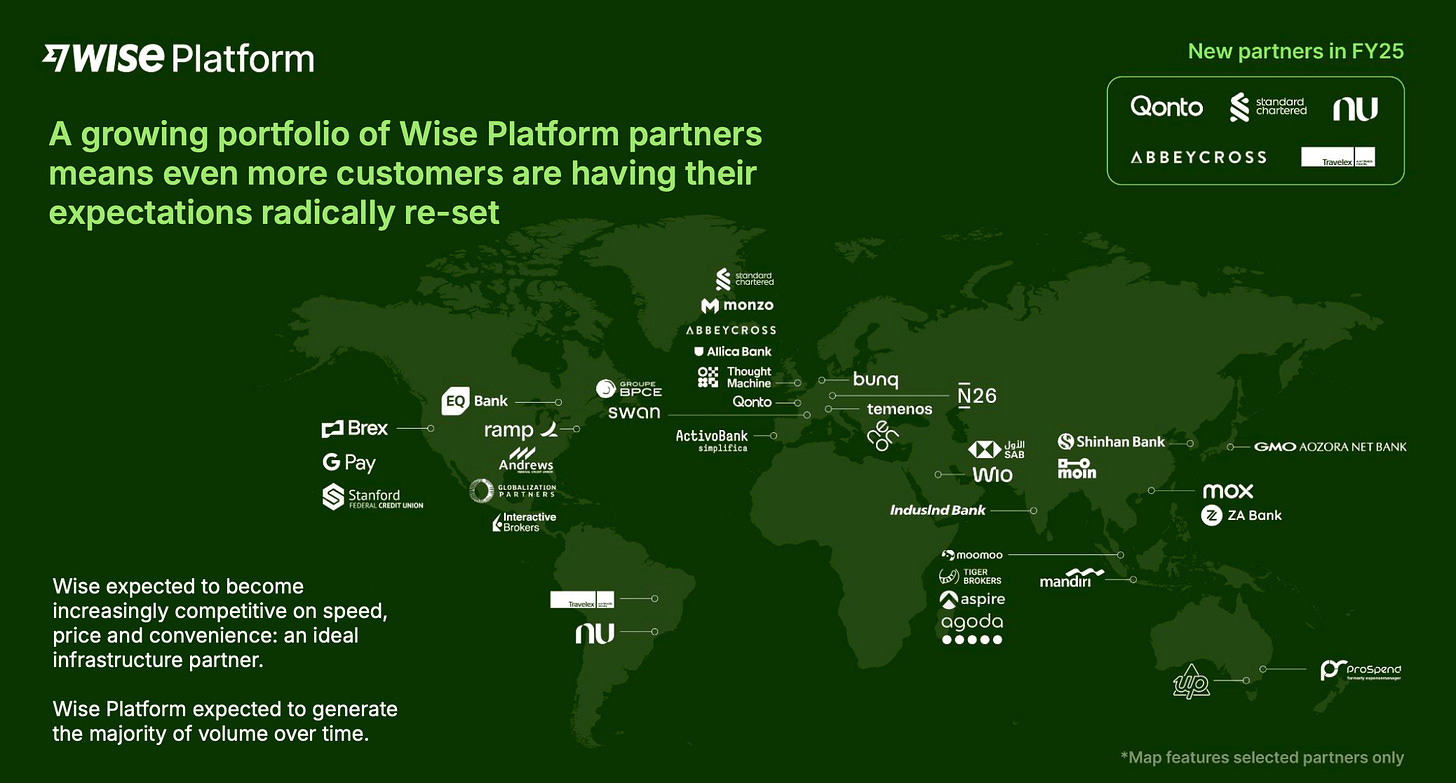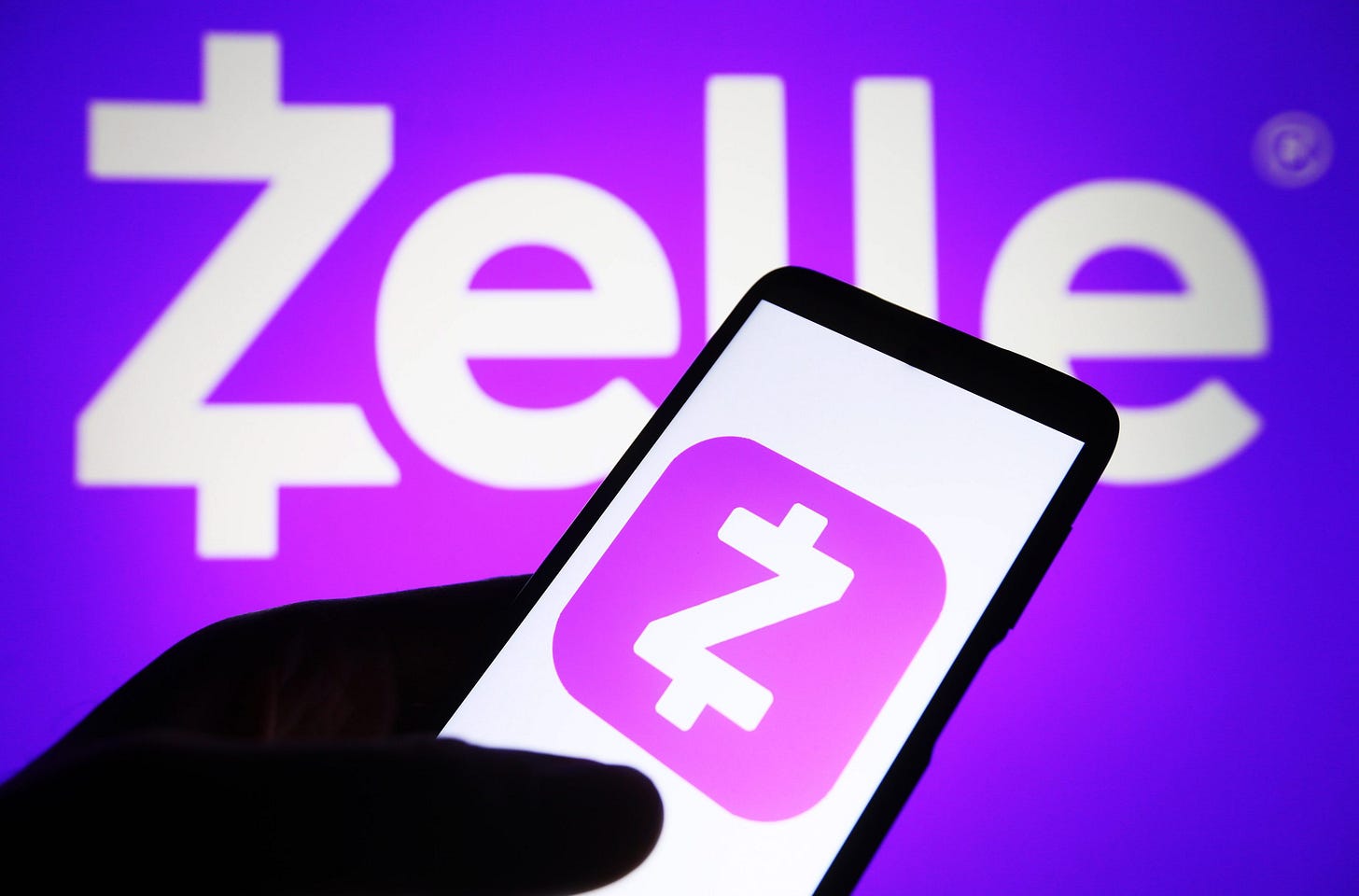Morgan Stanley's partnership with Wise signals a new era in x-border payments 🤝💸; dLocal is exploring strategic sale 👀💰; CFPB launches major legal action against JPM, BoA over Zelle fraud 😳🏦
You're missing out big time... Weekly Recap 🔁
👋 Hey, Linas here! Welcome back to a 🔓 weekly free edition 🔓 of my daily newsletter. Each day I focus on 3 stories that are making a difference in the financial technology space. Coupled with things worth watching & most important money movements, it’s the only newsletter you need for all things when Finance meets Tech.
This is the last weekly issue before the holiday break, so make sure you don’t miss the best stories, resources, and developments from this week:
The ultimate list of resources for building and scaling billion-dollar companies 🦄 [1,500+ pages of knowledge, data, and advice to launch & scale your next unicorn startup in 2025]
AI 100: Top Artificial Intelligence Startups of 2024 🤖💸 [these companies raised $28B already. Find whose backing them, unlock their exclusive pitch decks & learn from the best 🚀]
Global 6,200+ Investor Database to Fast-Track Your Funding in 2025 💸 [shorten your fundraising time, find your perfect investors, and close rounds faster]
Klarna says it stopped hiring thanks to AI 😳🤖 [what’s the real story here & what can we learn from Klarna + bonus list of top AI companies & their pitch decks]
AI reshapes finance as investments in AI-powered accounting solutions accelerate 📊🤖 [a quick look at two interesting latest developments, what they indicate & what’s next + bonus list of top AI startups of 2024 & pitch decks they used to raise $28B+ from VCs]
Chime takes major step toward 2025 IPO with confidential SEC filing 📑🔔 [quick recap of Chime’s biz model and latest numbers, why it matters & what’s next for FinTech + bonus read with some IPO resources inside]
Dave's remarkable turnaround 🐻 [how it flipped even NVIDIA & what can we expect next + bonus dives into Dave & co]
Deutsche Bank's Layer 2 blockchain initiative signals a major transformation in traditional finance ⛓️🏦 [what it tells us, why it matters & what’s next + bonus reads into the latest crypto industry trends & numbers]
NU invests in Tyme signalling push into Africa & Asia 😳💰 [what it’s all about & why it makes sense + bonus deep dive into NU & its biggest competitor]
Walmart's FinTech ambitions grow: One takes over multi-billion credit card portfolio 💳 [what’s the latest move all about, why it matters & what’s next for Walmart and other FinTechs]
The Ultimate List of Resources to Promote Your Startup for FREE 🚀 [380+ free places to post your project or startup to maximize exposure & accelerate growth ]
As for today, here are the 3 fascinating FinTech stories that were changing the world of financial technology as we know it. This was yet another awesome week in the Finance 2.0 space so make sure to check all the above stories.
Morgan Stanley's partnership with Wise signals a new era in cross-border payments 🤝💸
The news 🗞️ Banking giant Morgan Stanley MS 0.00%↑ has become the first major investment bank to adopt Wise's cross-border payment platform. The partnership enables Morgan Stanley to offer high-speed international payment settlements to its corporate clients through Wise's established infrastructure.
Let’s take a quick look at this and see why it matters.
More on this 👉 The collaboration represents a strategic shift in how investment banks approach cross-border transactions. Through integration with Wise's platform, Morgan Stanley will incorporate the payment functionality into its newly launched TFX Hub, focusing initially on serving U.S. corporate clients with international market needs.
The partnership leverages Wise's impressive capabilities, including connections to over 65 licenses and six direct payment systems, allowing 63% of cross-border payments to be completed in under 20 seconds.
While specific fee structures remain undisclosed, the revenue stream is expected to provide more stability compared to traditional trading income, which often fluctuates with market conditions.
Zoom out 🔎 This partnership marks yet another turning point in how traditional financial institutions approach financial technology integration. For Wise, securing Morgan Stanley as its first investment banking partner demonstrates the platform's growing credibility in the institutional financial sector. And the stock market is clearly in line with that:
The company has already established partnerships with over 90 banks globally, including a recent agreement with Standard Chartered for operations in Asia and the Middle East.
✈️ THE TAKEAWAY
What’s next? 🤔 Looking ahead, it’s clear that we’re going to see accelerated adoption of FinTech solutions by other (investment) banks seeking to remain competitive in cross-border payment services. Additionally, expect an increased focus on institutional partnerships by FinTech companies, moving beyond their traditional consumer and small business markets. Finally, the Wise & Morgan Stanley deal also signals the potential evolution of revenue models in investment banking, with greater emphasis on stable, fee-based income streams from digital services. Zooming out, the partnership also suggests a broader trend of traditional financial institutions recognizing the value of partnering with FinTech specialists rather than developing proprietary solutions. This strategic shift could lead to more efficient capital allocation and faster innovation in the financial services sector, ultimately benefiting end clients through improved service delivery and potentially lower costs.
ICYMI:
More FinTech consolidation? dLocal is exploring strategic sale 😳💸
The news 🗞️ Uruguay-based payments provider dLocal DLO 0.00%↑, currently valued at approximately $3.25 billion, is exploring potential strategic options, including a sale.
The company, backed by private equity firm General Atlantic as its largest shareholder, has enlisted Morgan Stanley to gauge acquisition interest from potential buyers, including private equity firms and major financial technology providers.
Let’s take a quick look at this.
More on this 👉 The exploration of a sale comes at a crucial juncture for dLocal, which has faced various challenges despite its extensive operational footprint across Latin America, Africa, and Asia. The company's shares, trading on the New York Stock Exchange since its 2021 IPO, have experienced a 33% decline year-to-date, affected by weak emerging market currencies and decreased cross-border payment volumes.
However, dLocal has shown resilience, reporting a 5% increase in gross profit in its latest quarterly earnings.
Also, we must note that this isn't DLocal's first consideration of a sale, as a similar initiative last year didn't materialize due to disagreements over financial terms. The current exploration thus reflects broader industry trends, as the payments sector undergoes significant consolidation following the post-pandemic normalization of digital payment volumes.
✈️ THE TAKEAWAY
What’s next? 🤔 The potential sale of dLocal could have some interesting implications for both the company and the broader FinTech industry. Here’s what we should be thinking about:
Industry Consolidation: The payments sector is likely to see accelerated consolidation as companies seek scale and technological capabilities to compete effectively. This trend is evidenced by recent transactions like Advent International's $6.3 billion acquisition of Nuvei.
Market Evolution: The exploration highlights the challenges facing FinTech companies in emerging markets, particularly regarding currency volatility and market-specific operational hurdles. Future success in these markets may require deeper pockets and more robust infrastructure that larger financial institutions can provide.
Strategic Positioning: For potential acquirers, dLocal represents an attractive opportunity to gain immediate access to emerging markets and a prestigious client base that includes Amazon AMZN 0.00%↑, Microsoft MSFT 0.00%↑, and Google GOOGL 0.00%↑. This could trigger increased interest in similar regional payment providers, potentially leading to more M&A activity in the sector.
Looking ahead, one thing is clear - we should expect increased scrutiny of FinTech valuations and business models, particularly in emerging markets. And the outcome of dLocal's strategic review could therefore set important precedents for how similar companies approach market challenges and strategic alternatives in the evolving digital payments landscape. Will be watching this closely 🔎
ICYMI: Emerging markets payments pioneer dLocal shows resilience amid growing pains 💪💳 [unpacking the most important numbers, what they mean & what’s next for dLocal]
CFPB launches major legal action against JPMorgan, Bank of America over Zelle fraud 😳🏦
The news 🗞️ The Consumer Financial Protection Bureau (CFPB) has initiated a significant lawsuit against three of America's largest banks - JPMorgan Chase JPM 0.00%↑, Bank of America BAC 0.00%↑, and Wells Fargo WFC 0.00%↑ - along with Zelle's operator Early Warning Services, alleging inadequate consumer protection measures on the popular payment platform.
Let’s take a look at this and see why it matters.
More on this 👉 The lawsuit, filed in Arizona, claims that these institutions rushed Zelle to market without implementing proper safeguards, resulting in approximately $870 million in fraud-related losses across the three banks since Zelle's launch in 2017.
The CFPB's investigation revealed that consumers were often left vulnerable to various fraud schemes, including account takeover fraud and unauthorized transfers.
CFPB Director Rohit Chopra emphasized that the banks' competitive pressure to counter other payment apps led to hasty implementation without adequate security measures. The lawsuit specifically targets these three banks, which account for 73% of Zelle's transaction volume, though Early Warning Services is owned by seven major U.S. banks in total.
The response 🥊 The banks and Zelle strongly contest these allegations. Bank of America maintains that 99.95% of transactions proceed without incident, while JPMorgan Chase characterizes the lawsuit as politically motivated and an overreach of CFPB's authority.
Zelle's spokesperson argues that their fraud prevention measures exceed legal requirements and claims the CFPB's actions could negatively impact smaller financial institutions.
✈️ THE TAKEAWAY
What’s next? 🤔 At the core, this legal action signals a pivotal moment for the digital payments industry. Here’s what we can expect next:
Enhanced Security Protocols: The FinTech industry may see accelerated implementation of more robust fraud prevention measures, potentially including advanced identity verification systems and cross-platform fraud detection.
Regulatory Framework Evolution: This case could establish new precedents for how payment platforms balance convenience with security, potentially leading to standardized security protocols across the industry.
Market Restructuring: Smaller banks and credit unions might face increased costs to maintain compliance, potentially leading to industry consolidation or new partnership models.
Consumer Behavior Impact: The outcome could influence consumer trust in digital payment platforms and potentially shift market share among various payment solutions.
That said, this lawsuit represents a critical juncture in the ongoing evolution of digital payments, with implications extending far beyond the immediate parties involved. The resolution will likely shape the future of consumer protection standards in financial technology and influence how banks approach the balance between innovation and security in payment services. We will be watching this 🔎
ICYMI: JPMorgan Chase UK makes strategic move into credit cards 🇬🇧💳 [what it tells us & what we can expect next + bonus deep dives into JPM’s latest financials & more bonus reads inside]
Bank of America’s 3Q24: a resilient giant poised for growth 📈 [breaking down the most important numbers, what they mean & what’s next for BoA]
Wells Fargo’s Q3 2024: weathering the storm, but clearer skies ahead? 🌤️🏦 [a closer look at their Q3 2024 numbers, what they mean & what’s next + bonus deep dives into two other finance behemoths]
Morgan Stanley's resilience shines amidst market volatility 👏📈 [breaking down the latest Q3 2024 financials, what they tell us & what’s next + bonus deep dives into other financials behemoths inside]
Goldman Sachs firing on all cylinders as investment banking prowess shines 😤💸 [unpacking the most important numbers, what they mean, and whether Goldman is worth your time & money in 2024 + more bonus reads & deep dives inside]
Citi's transformation: high-risk, high-reward bet on banking turnaround 🏦 [unpacking Citibank’s most important Q3 2024 numbers, what they mean & whether Citi is worth your time and money in 2024 + bonus deep dives into other financials giants]
🔎 What else I’m watching
Remote Introduces Stablecoin Payments for Global Contractors 🌍 Remote in partnership with Stripe has launched stablecoin payments for contractors in 69 countries, starting with USDC on the Base network. This feature, initially available to US-based companies, offers faster compensation for international contractors while ensuring regulatory compliance. Stablecoin payments integrate with Remote's existing contractor management services, providing a unified platform for onboarding, invoicing, and payments. The system enables near-instant payouts in USDC, addressing delays in traditional international payment processes. Disclaimer: Stripe is using Zero Hash for this, and I’m part of Zero Hash.
Neonomics Files Complaint Over Anti-Competitive Practices in Norway's Payments Market 🚨 Neonomics has filed a complaint with the Norwegian Competition Authority, alleging anti-competitive practices by the country's banking sector. The open banking data vendor claims that banks have undermined the EU's PSD2 directive by limiting access to critical payment markets, blocking direct debit payments, and applying unreasonable prices and terms for essential services. These practices are said to create barriers for third-party providers and favor established players like Vipps, Visa V 0.00%↑, and Mastercard MA 0.00%↑. ICYMI: Norwegian FinTech makes history as first Apple Pay competitor on iPhone📱🇳🇴 [what it’s all about, why it matters & what’s next + bonus dives into Apple & Co]
Bulgaria Joins TIPS, Boosting Euro Integration 🇪🇺 The European Central Bank has welcomed Bulgaria to the TARGET Instant Payment Settlement (TIPS) service, following a successful migration in December 2024. The Bulgarian National Bank, BISERA payment system, First Investment Bank AD, and Central Cooperative Bank AD are now part of TIPS, with more providers expected to join in 2025. This move supports Bulgaria's plan to join the euro area, enabling instant EUR transfers for individuals and businesses. TIPS operates 24/7, facilitating instant payments in central bank money and adhering to the SEPA Instant Credit Transfer scheme.
💸 Following the Money
Chainalysis has purchased Hexagate, a company specializing in web3 security solutions that detect and tackle real-time threats, including cyber exploits.
PayPal Ventures joined a $30M round in the fraud prevention platform Bureau.
Parafin, which builds embedded finance infrastructure, has announced the close of its $100M Series C financing at a $750M valuation.
👋 That’s it for today! Thank you for reading and have a relaxing Sunday! And if you enjoyed this newsletter, invite your friends and colleagues to sign up:
P.S. we’re returning to the regular cadence on the 6 of January but don’t worry - there will be several special issues until then. So stay tuned!









The Wise story is raising positive eyebrows for me as I have had good interactions with using Wise services.
The Zelle story is raising negative eyebrows for me as I have had a bad interaction with them in regards to a wire scam.
This can't be free... too good. thanks again!